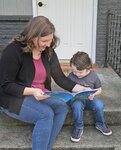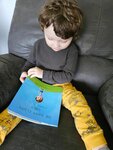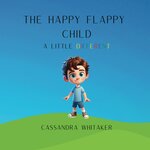



A Napavine mother, Cassandra Whitaker, has written and published a children’s book to help people better understand autism.
After a personal journey, she saw the need for people to get the proper information and treat others with kindness, she said.
Whitaker’s youngest son, Wyatt, was diagnosed with nonverbal autism last year. While he doesn’t have words, Wyatt expresses himself in other ways, such as stimming when he is happy. Stimming is a range of repetitive movements and behaviors, which can include hand-flapping and vocals. It can be used to calm down, soothe or regulate the nervous system.
“When Wyatt is happy, he flaps his arms,” Whitaker said, "which causes people to stare, point and even laugh at him in public.”
Whitaker wanted to change the public perception of stimming and raise awareness about autism, so she wrote “The Happy Flappy Child” in hopes of teaching people that it’s OK to be different, but it’s not OK to be mean.
“As parents, we all want our children to be accepted and included,” Whitaker said. “The best way for children to learn is by being read to by their parents or reading themselves. I wanted other children to know that even though Wyatt cannot say words, he still wants to and loves to play. Even though he flaps his arms and vocal stims, it isn't anything wrong or scary. It's just because his brain works differently.”
Whitaker said her goal is acceptance. She wants other parents to know what “stimming” is and that it isn’t a bad thing. Wyatt stims openly when he goes places, and sometimes Whitaker has to ask people to stop staring.
“It’s not a great feeling,” Whitaker said. "My hope for this book is that it gives people a better understanding of autism and a reminder to be kind.”
When inspiration struck to write the book, Whitaker woke up on a Saturday morning a few weeks ago and sat down with her notebook and pencil.
“It just came out,” Whitaker said. “I spent all day on it. The next day, I finished it and read it to my husband, Eric, and our older son, Jackson. We fine-tuned it, and then there it was: a book about acceptance, inclusion and kindness.”
A friend had mentioned Amazon Kindle Direct Publishing to Whitaker, and she started looking into the guidelines. She laid out and designed the book in Canva, using several computer programs to fine-tune the images and characters. After uploading it to Amazon and having it reviewed, “The Happy Flappy Child” was ready to purchase.
The book itself is written from Wyatt’s perspective, explaining why he sometimes doesn’t respond to his name or make eye contact and why he sometimes lines up toys.
“It then explains that he has autism and his mind works in different ways,” Whitaker said, “that when things are loud or there are a lot of people, it can be hard for him to manage his emotions. It says he doesn’t understand things other kids his age would, such as sharing.”
The book explains that when he gets happy, he gets flappy, and what that looks like.
“Sometimes it’s not just flapping, but spinning or humming (vocal stimming),” Whitaker said. "He knows it can be strange to see, but he asks kids not to laugh or stare and just wants to be included in play.”
Whitaker said the book teaches kids to be kind when they see another kid like Wyatt.
The author hopes to get the book donated to local school districts. Whitaker has partnered with Shawna Haller, the coordinator of Lewis County Parent to Parent, a support group for parents with children who have disabilities. They have reached out to Onalaska and Napavine and hope to have the book donated to every school district in Lewis County.
“I would love for other parents to know that they are not alone,” Whitaker said. “Early intervention is so important; if you have concerns, please don’t wait.”
Wyatt was born 10 weeks early and weighed only 3 pounds in April 2020, during the height of the COVID-19 pandemic. He was a happy, engaging infant who was meeting milestones and was being closely followed by the Tacoma General NICU followup team every six months.
At 12 months, Whitaker said she noticed Wyatt doing “motorcycle hands” when he could get excited, and soon after, he would sit and flap his arms when he was happy. There was also a delay in motor skills, such as walking and crawling.
The Whitakers got a referral to the In-Tot Developmental Center, and Wyatt started occupational therapy and speech therapy just after he turned 2 years old.
“I had already been having concerns but did not think it was autism,” Whitaker said. “I thought it was just a speech delay.”
Whitaker said she would spend hours scrolling TikTok videos posted by mothers of children getting a diagnosis.
“Then I would watch Wyatt for weeks,” Whitaker said. "I would go back and forth: Yes, he is, no, he isn't. I would cry filling out those milestone papers at the doctor’s office, marking no to things that my child should be doing.”
It took Wyatt a long time to get referred to behavioral health. A neurology team didn’t see him until he was 3 years old.
“Each physician told me something different,” Whitaker said. “He was for sure autistic, then he wasn’t. No one could agree.”
Eventually, Wyatt was diagnosed with level three autism, speech disorder and sensory processing disorder.
“Even though by this time, I knew he was autistic, I had done the work from denial to acceptance and just wanted to give my child the support he needed,” Whitaker said. “So, finally hearing someone say, ‘yes,’ this is what it is, felt like I had just finished a marathon.”
Whitaker said she thought the entire process was longer than it should have been and that conflicting results made it confusing for concerned parents. She said one physician didn’t want to give the diagnosis because she didn’t feel like Whitaker was ready to hear he was autistic.
“Why? Would I love him any less?” Whitaker said. “Absolutely not. Autism or not, he is still my Wyatt.”
Whitaker added there is so much misinformation regarding autism, including an association with low intelligence.
“This is incorrect,” Whitaker said. “Wyatt is so smart. He just can’t speak in words. People don’t want to start the process of a diagnosis because they don’t want to ‘label’ their kids. Autism isn’t a label. It’s an explanation.”
Other misinformation includes people who say vaccines cause autism, which the scientific community has thoroughly debunked. Some people say their kid can’t be autistic because their kid likes to cuddle or hug, which can be true for some children but not all of them. Others think autistic meltdowns are the kid being naughty, when in reality, it can be sensory dysregulation.
“This is where I wish people could be more understanding and a little less judgmental towards other parents,” Whitaker said.
Whitaker said there are many programs in Lewis County that can help with early support and intervention. The county has two birth-to-3 programs: a “Growing Together with Summit” serving Chehalis and Centralia and an In-Tot Developmental Center with Reliable Enterprises, which serves the rural communities in the county.
“Most of those services are free to families and don’t need a doctor’s referral,” Whitaker said. “As a parent, if you have concerns, all you have to do is call to start the referral process.”
Whitaker said these programs helped tremendously with Wyatt’s diagnosis and gave her the tools to help understand her children’s needs. She now works with In-Tot to help other parents in their journeys and share information with others.
For more info on the In-Tot Developmental Center, go to https://reliableenterprises.org/in-tot/.
Whitaker’s book, "The Happy Flappy Child," can be found at https://a.co/d/8FDFzKP.